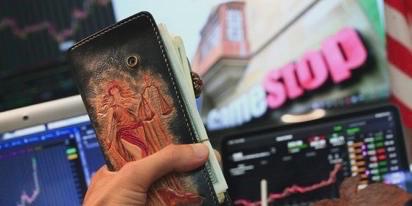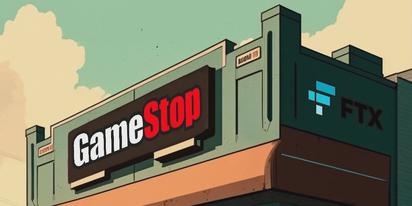A Wild Ride That Never Ends
In January of 2021, GameStop’s common stock dominated the zeitgeist as it rocketed in price by over a thousand percent. The wealthiest man in the world tweeted “Gamestonk!!” with a link to r/wallstreetbets. Robinhood and other retail brokerages disabled the ability to buy shares. Retail investors cheered as hedge funds like Melvin Capital got creamed. And through it all, the financial news media was on fire, churning out hourly updates and warnings about why GameStop was, at best, a dangerously risky investment.
This story should have ended in February 2021, with GameStop shares falling back to earth. However, many retail investors haven’t sold. The company is going all-in on a technology turnaround. The talking heads on CNBC are still arguing about why GameStop is a terrible investment.
Don’t get me wrong; there are other so-called “meme stocks” in this saga. Every few weeks, a new sideshow or drama steals an ounce of our attention (I’m looking at you, AMC, and Bed Bath & Beyond). Still, the story always finds its way back to GameStop. Benzinga, MarketWatch, Seeking Alpha, Motley Fool, and CNBC—to name but a few media outlets—remind us that GameStop is a failing brick-and-mortar retailer with no plan. According to the “people who know better,” you should not invest your money in GameStop.
Unless you’ve lived under a rock for two years, you probably have an opinion about GameStop. I’ve followed the ups and downs and myriad developments with great interest because I’ve been a GameStop shareholder since before the insanity of 2021. I’m reasonably confident that most retail opinions about the company are ill-informed due to bad actors intentionally misleading them.
So here is the ugly truth about GameStop: everything that transpired before that wild January, what happened since, and where the story is going in the future.
A Big Short & A Roaring Kitty
“Michael Burry” may not be a household name, but it’s arguably close. He was played by Christian Bale in The Big Short—a movie about all the fuckery that caused the 2008 subprime mortgage crisis. Burry, and the investors in his hedge fund, made millions using a financial instrument called a credit default swap. If you want to know more, you’re better off watching the movie. For now, you only need to know that Burry made a well-informed bet that the housing market would crash, and he was right.
Burry’s firm purchased 5.3% of GameStop’s outstanding shares in 2019. He also filed a letter to the GameStop board urging them to buy back roughly two-thirds of their outstanding stock, which was trading for less than $5 at the time. He wrote in the letter that “GameStop could pull off perhaps the most consequential and shareholder-friendly buyback in stock market history with elegance and stealth.”
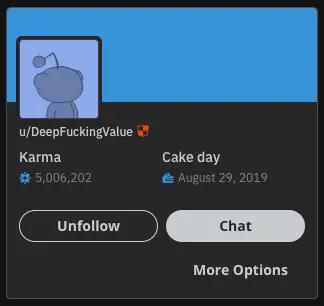
However, Burry was late to the party. In a moderately obscure corner of Reddit—where users post screenshots of risky option trades while lovingly referring to themselves as “autists” and other crass terms—one user named DeepFuckingValue posted about his $53,000 investment in GameStop. He also began posting on YouTube and Twitter under the username Roaring Kitty.
Other users were quick to mock him. After Burry disclosed his position, DFV continued to post about it, despite the constant headwinds in the comments:
- “I forgot shit companies that are barely clinging to life always come roaring back from terrible earnings. RemindMe! 15 months and 29 days from now to confirm this idiot lost it all” — u/j1187064
- “You could land a 747 between the spread on these [options]. Possible no one will even buy these at the mid. Sell now” — u/Options_100
- “I really hope you sold those contracts.” — u/Leaveittoybot
- “Nah” — u/DeepFuckingValue
Nothing would change until late 2020, but to understand why everyone was urging DFV to sell, we need to talk about the state of GameStop at the time.
Everyone Was Right: GameStop Sucked
GameStop dominated the retail video game space for decades by purchasing and reselling customers’ used games. This practice cut the publishers out of the profits, and it was a highly successful practice. They were expanding like crazy, buying out their competition—EB Games, Rhino Video Games, Micromania, and many others—in a successful effort to become the world’s largest video game store.
It worked great until it didn’t. The bear thesis on GameStop looks like this:
- With the 2013 console cycle, every game was available to purchase from digital storefronts, threatening GameStop’s core business.
- Gamers downloaded their games straight from Sony, Microsoft, Nintendo, and Valve.
- GameStop was expanding into smartphone stores, buying over a thousand mobile-phone stores from Spring Mobile and AT&T. These acquisitions were disastrous, and GameStop fell into massive debt while their video game sales were declining by double digits.
- GameStop refused to adapt with the times. They were becoming the next Blockbuster Video.
Through the 2010s, GameStop stubbornly refused to innovate in their core video game business, and by 2018 they were desperately looking for private equity to buy them out. They eventually announced that going private was off the table, and the stock price fell to less than $5 a share.
Meanwhile, the short-sellers were piling on. By the time Michael Burry acquired his stake, Bloomberg had reported short interest in GameStop stock at a staggering 74%.
Short Interest
You can skip this explainer if you already know everything about short interest. The rest of you should strap in because this shit is wild.
Everyone knows that Wall Street makes money when stocks go up. It’s also colloquially understood that they can make money even when stocks go down. Short selling is one of the ways that they do it.
A Simple Short Example
Let’s say $GME is sitting at $10 per share, and you think it will go down because the company is ignoring the digital revolution in gaming. You borrow 100 shares from a brokerage firm and immediately sell them at market price for $1,000.
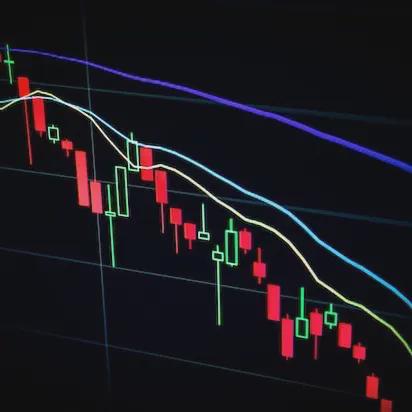
Two months later, $GME has fallen to $5 per share. You buy 100 shares for $500 and give them back to the lender. Voilà: you just pocketed half a grand while GameStop’s shares went down.
But what if you were wrong, and $GME moved to $20 per share? You would still owe the lender 100 shares, but you’d need to pay $2,000 to repurchase them.
For the privilege of borrowing the shares, you pay a fee (known as the Cost to Borrow), and you maintain enough collateral in your account to keep the brokerage firm happy. If the trade starts moving against you, they’ll ask you to pony up more collateral, or they will liquidate your account to buy the shares.
Short Interest is the ratio of the number of shares sold short over the total outstanding shares. Investors and analysts consider anything over twenty percent as excessively high short interest.
Why It Matters
If the price of a security is a function of supply and demand, imagine the distortion effect of increasing the supply by 75%.
It’s easier to grasp if you consider small numbers. Say there are 100 shares in the market, and someone borrows 75 of those shares and sells them back into the market. The owners of the original shares still own them, but now there are 75 quasi-new shares in the market. Artificial selling pressure like this can lower the price. Meanwhile, investors own more than 100% of all shares.
Everything above should sound crazy to a sane person, though short-selling advocates have a million reasons to defend the practice. I won’t enumerate them here because they are entirely bullshit.
75% is a ton of short interest, but by January 2021, the short interest for $GME was over 140%.
Naked Short Selling
I have to explain naked short selling before getting back to the main topic, though I’ll gloss over a few details in the interest of brevity. I’m getting into the weeds, but it’s vital to the overall story to understand this concept.
There are two flavors of naked short selling: legal, bona fide market-making shorts and illegal, easy money shorts.
Let’s start with the juicy illegal stuff.
Breaking The Law For Fun And Profit
You think GameStop will go entirely out of business, but the stock is already shorted to hell, so the borrow fees and collateral requirements are sky-high. Why not skip the borrow step? If you can create 100 synthetic shares and sell them into the market, your account will show -100 $GME shares, but no lender is banging on your door if the price goes up.
Our fancy markets are stuck in the dark ages, so the rules permit you to wait a few days to deliver shares to the buyer after a sale. That’s plenty of time to distort the price and make a profit. Even if you never deliver the shares, our markets have a system to give you more time to settle via the Failure To Deliver process.
Did you know that if a company goes out of business and the stock gets delisted, you don’t have to buy back shares that were sold short? This is known as the “Bankruptcy Jackpot,” and boy, is it lucrative. Why not generate a million shares and sell them into the market, collecting cash for the sales and driving the stock’s price into the dirt?
This scenario is, of course, illegal. But the fines for getting caught are often far less than the profit from the practice.
Legally Fucking Around For Fun And Profit
What’s left is the legal kind of naked short selling.
Liquid markets are lovely. A liquid market is one where I can buy or sell securities without waiting for a counterparty. Our markets employ “market makers” as middlemen to achieve that level of liquidity. If I purchase 100 shares of GME, a market maker is allowed to generate 100 synthetic shares and sell them to me while they wait to buy them from someone else.
That sounds nice on the surface, but it circumvents the concept of supply and demand. If I want to buy 100 shares and no one is selling them for the price I’m asking, I should have to increase my bid until my order is tempting enough that someone fills it.
I’m simplifying a million nuances here, but that’s the concept. Just understand that this kind of naked short selling is perfectly legal. I’ll delve into why it’s problematic when I bring in Citadel and Citadel Securities later.
Wow. That explainer got long-in-the-tooth, but the GameStop saga is rife with complex topics, so I’ll sometimes dig deep to paint a precise picture.
RC Ventures LLC

On November 16, 2020, Ryan Cohen filed a letter to the GameStop Board of Directors. He was now one of GameStop’s largest stockholders. The company’s performance was shit, CEO George Sherman was terrible, and the board needed to adopt a proper roadmap to create shareholder value.
That roadmap included shuffling the board of directors, dropping the lackluster CEO, and a quick, massive pivot “from a brick-and-mortar mindset to a technology-driven vision.”
The stock rallied in August and September, but Cohen’s letter in November was a linchpin snatched from a grenade. $GME experienced violent ups and downs through December. The world remembers January 27th, but before $GME entered mainstream consciousness, it multiplied ten times by January 14th, and short interest ballooned to 140%.
Take a second to consider the implications of 140% short interest. To get to 100% short interest, every share in the float must be borrowed and re-sold into the market. That’s crazy. To get to 140%, short sellers borrow the shares again, and sell them again.
Unless the company goes out of business, those short positions must be re-purchased. And with Ryan Cohen—a massively successful e-commerce entrepreneur—grabbing the board by the balls, GameStop was one step farther away from going out of business.
The Market Sneezed
By late January 2021, the buzz on the internet about GameStop was at a fever pitch. Millions of retail investors were buying GME shares and GME options.
The pervasive idea that a short squeeze was inevitable fueled the frenzy. WallStreetBets catapulted into the spotlight. A new movement was born, where “apes” would hold on to their shares forever, bleeding dry the hedge funds that shorted GME. Hedge fund managers—particularly long/short funds—were the enemy. A decade of retail frustrations stemming from the 2008 financial crisis culminated in a rallying cry for “diamond hands.”
With GameStop rising, short sellers were not taking it lying down. Andrew Left of Citron Research famously tweeted that GameStop was going back to $20 fast. He called GameStop buyers “suckers at this poker game.” Every analyst in the business urged retail buyers to sell their shares. Ken Griffin’s Citadel and Steven Cohen’s Point72 dumped $2.75 billion into Gabe Plotkin’s Melvin Capital, a firm that held a massive number of shorts on GameStop. One can only assume this capital protected the firm from being liquidated.
Whales jumped into the fray. Dave Portnoy of Barstool Sports fame bought shares (he would eventually sell for a $700k loss). Billionaire tech investor Chamath Palihapitiya bought call options and tweeted about it. Cameron Winklevoss tweeted “Thinking about going long GameStop $GME. Thoughts?” And then, of course, there was Elon Musk’s Gamestonk tweet endorsing the action.

On January 26th, the price began climbing to the moon. It rose over 92% in one day. The next few days would see wild swings, with an intra-day high of $483 (up from less than $20 just a few weeks prior). But something seemingly unexplainable was happening on the sidelines: other companies’ stocks were also experiencing solid gains as if they were trading in tandem with GameStop.
- Naked Brand Group was up 18%.
- Fashion retailer Express rose 28%.
- Headphone manufacturer Koss Corporation rose 52%.
- And AMC Entertainment, whose CEO Adam Aron would go on to grift retail investors for years, went up 54%.
- Even BlackBerry, which no longer sells phones, soared 112%.
Seemingly unrelated companies were surging with GameStop, but before anyone in retail could figure out why, the industry pulled the rug out from under them.
Position Close Only

On January 28th, retail trading institutions disabled the ability for retail to buy GameStop, AMC, and other shares that were surging. Robinhood took the spotlight and most of the blame, but the list of brokers that halted buying was long: eToro, E*TRADE, Freetrade, Interactive Brokers, Merrill Lynch, Stash, WeBull, and on and on. Retail was allowed to sell their shares, but they couldn’t buy. With the buying pressure extinguished, the price of GameStop plummeted.
“Turning off the buy button” caused one hell of an uproar. In the following days, speculations of fraud ran wild. Steven Cohen openly mocked retail on Twitter. Billionaire Mark Cuban did an AMA on WallStreetBets telling retail investors that they could still fight the good fight. Robinhood CEO Vlad Tenev, Citadel’s Ken Griffin, Melvin Capital’s Gabe Plotkin, and WallStreetBets’ own Roaring Kitty testified before the House Financial Services Committee in a fruitless effort to shed light on what exactly happened at the end of January.
And that was it. It was all over. Some people made a ton of money, and some people lost money.
I can end this blog post now. Right?
Short Sellers Really, Definitely, Pinky-Swear, Closed Their Shorts. Please Believe Me.
In the early morning of January 27th, CNBC’s Andrew Ross Sorkin nervously announced that Melvin Capital had closed their GameStop short positions, taking a considerable loss. He assured his viewers that he had just been on the phone with Gabe Plotkin, and that Melvin wasn’t going out of business, despite being “attacked by an army of investors trying to push up and press up the stop—the stock, rather—of GameStop.” He reiterated that Melvin Capital was “out of the stock. They got out of the stock, from what I understand, yesterday afternoon.”
Hedge funds don’t like sharing their positions; they don’t want to telegraph information to their competitors. There are only two explanations for hedge fund managers revealing their portfolio positions:
- They are legally required to do so.
- They are lying.
What’s important when you’re in that hedge fund mode is to not do anything remotely truthful, because the truth is so against your view that it’s important to create a new truth—to develop a fiction.
Jim Cramer, December 22nd, 2006
Through the Looking-Glass
After the January sneeze, retail started asking questions and collaborating on research. There have been several subreddit migrations (the reasons for which could fill a series of blog posts), but these days you can find most of the information and community on r/Superstonk. On Superstonk, retail investors zeroed in on Ken Griffin of Citadel and Citadel Securities.
One burning question, in particular, was why Citadel (and, to a lesser extent, Point72) invested billions into Melvin Capital. These hedge funds compete with each other, so it was counterintuitive to watch them bail out Melvin. A persuasive theory is that most short positions were not closed during the January sneeze and that Citadel carries massive GME short exposure. In other words, if Ken Griffin had allowed a short squeeze to liquidate Melvin Capital, the price of GameStop would have gone far higher, putting Citadel in danger of being liquidated.
A Staff Report from the SEC corroborates the idea that short covering did not cause the runup in January.
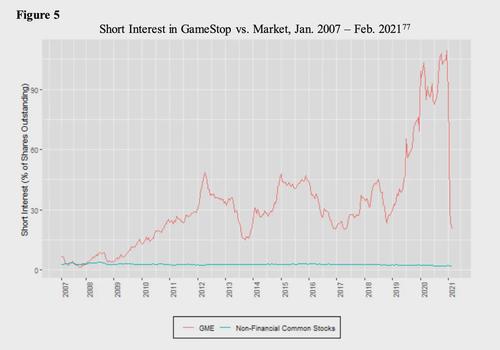
Whether driven by a desire to squeeze short sellers and thus to profit from the resultant rise in price, or by belief in the fundamentals of GameStop, it was the positive sentiment, not the buying-to-cover, that sustained the weeks-long price appreciation of GameStop stock. […] While a short squeeze did not appear to be the main driver of events, and a gamma squeeze less likely, the episode highlights the role and potential impact of short selling and short covering.
Staff Report on Equity and Options Market Structure Conditions in Early 2021
If shorts didn’t cover, why did the reported short interest plummet? That’s a tricky nut to crack because the market’s inner workings are deliberately opaque. However, the theory that holds the most water is that short sellers have used complex financial instruments known as equity swaps.
Total Return Swaps
According to Investopedia, a total return swap “is a swap agreement in which one party makes payments based on a set rate, either fixed or variable, while the other party makes payments based on the return of an underlying asset, which includes both the income it generates and any capital gains.”
Swaps are much more complex than simple short sales. It’s a way to go long or short a stock without holding a position.
Total Return Swaps For The Rest Of Us

I don’t want to oversimplify swaps, but this comment from u/anon_lurk on Superstonk does an excellent job of breaking it down without losing too much context, so I’m going to paraphrase them here.
Imagine you are a farmer, afraid that bird flu will kill all your chickens. You lend your chicken coop to another farmer in exchange for their corn operation this season.
You still own the coop, and they still own the corn field, but you profit from the corn, and they profit from the chickens. Maybe chickens are three times as profitable as corn, and the other farmer is okay assuming the bird flu risk for the possibility of making more money. Meanwhile, you would rather have your guaranteed corn profits with less risk. So you swap the variable risk event for the fixed event.
As pointed out by u/WoodPunk_Studios later in the thread, “Makes sense when both of the sides of the trade are long. Try figuring it out with a short position on one side and you’ll quickly understand that this is straight up fraud. If not by the letter of the law, by it’s spirit.
“Extending the example, let’s say you as a farmer sell a corn future, but you don’t grow any corn, so you swap your chicken for the counterparties corn which neutralizes your risk from the sold future. [B]ut if the corn gets blighted you still have the obligation from the original short and you might need to sell your chicken coop (after the swap terminates) to meet that obligation.”
Hedge funds love these swaps because it allows them to hide their positions from their nosey competitors. Ken Griffin considers Gabe Plotkin to be “one of the finest investors of his generation”, but if Gabe was competent—or perhaps less greedy—he would have used swaps to hide Melvin Capital’s massive short position in GameStop.
Citadel, Citadel Securities, and PFOF
Citadel is an asset management firm (i.e., a hedge fund), Citadel Securities is a market maker, and Ken Griffin owns both. If Ken Griffin exposed himself to GameStop, Citadel would hold that exposure (not Citadel Securities).
Citadel Securities is one of Robinhood’s largest customers. They pay Robinhood and other brokerages for “order flow,” meaning they execute orders and try to scrape a small profit on each trade. Still, they don’t need to make a direct profit because controlling orders and data is potentially far more profitable. They are responsible for handling up to 40 percent of all retail trades.

Citadel Securities is an internalizer. They take an order from a broker and decide to settle the trade themselves or route it to a marketplace.
So what does all this mean? Let me tie it together:
Hypothetically, Citadel Securities could route GME buy orders to their internalizing operation and sell orders to the markets, causing a lopsided amount of pressure on exchanges (i.e., lots of sales and no purchases). Why would they do that? Well, imagine if their wholly separate and unrelated Citadel hedge fund were inordinately short GameStop, and retail investors were constantly buying GameStop shares, every day.
The Depository Trust Company & The Direct Registration System
It may surprise some readers to know that when you buy shares via a broker, you don’t own them. The shares are held for you “in street name.” Even more surprising, the broker facilitating your trade doesn’t own the shares either. Cede & Co., which processes stock transfers on behalf of Depository Trust Company, owns all the shares traded on the New York Stock Exchange, Nasdaq, and other exchanges. The DTC is a central securities depository, and your broker has an account with them.
[I]nvestors do not themselves hold direct property rights in stock, but rather have contractual rights that are part of a chain of contractual rights involving Cede.
From Wikipedia, citing https://en.calameo.com/books/0000022853581665d62bf
The only entity that knows who owns your shares is your broker. When you sell the shares, the DTC transfers contractual rights to the shares from one broker’s account to another.
The brokers are loaning shares to short sellers for them to sell short, collecting fees for those loans and distorting your investment.
Purple Circles
Despite the absolute craziness above, retail figured out that there was a way to register their shares in their name.
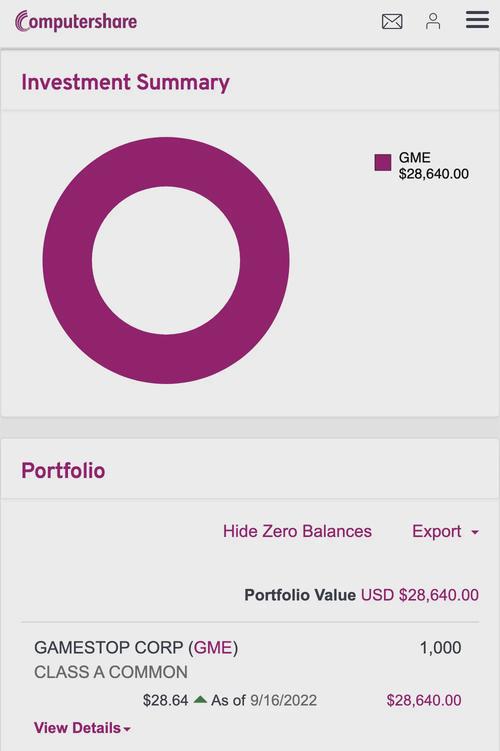
After Superstonk hosted fantastic interviews with industry experts such as attorney Wes Christian, author Susanne Trimbath Ph.D., GameStop’s transfer agent Computershare, and many, many more the members of Superstonk started a new movement.
Individual investors began using the Direct Registration System to pull their shares out of the DTC and register them in their names with Computershare. The theory is that if all the shares are removed from the float, perhaps the shorts would finally be forced—kicking and screaming—to close their positions.
What happens to the price of a stock when millions of diamond-handed investors lock the float? No one has ever done this, and it’s one hell of an exciting experiment.
They began tracking their progress by posting screenshots of the Computershare Investor Center dashboard showing a sizeable purple circle. I’ve included a screenshot of my shares here.
Incredibly, GameStop now reports the number of directly registered shares when filing quarterly earnings paperwork with the SEC. As of July 30, 2022, 71.3 million shares were directly registered with Computershare.
Buying And Holding Isn’t Terrorism
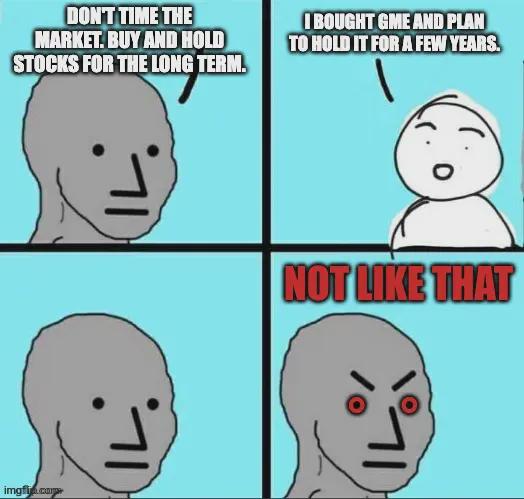
When listening to CNBC and other news outlets, the narrative about GameStop’s share price often becomes a battle—devious retail pump-and-dump schemers on one side versus honest, embattled hedge funds protecting teachers’ pensions on the other.
What utter nonsense.
The narrative is flawed because retail investors are not selling their shares (i.e., they aren’t dumping). One of the tenets of sound investing is buying companies one believes in and holding those shares over the long term.
Time to dust off this old chestnut:
The stock market is a device for transferring money from the impatient to the patient.
Warren Buffet
If buying and holding a stock is considered nefarious, how exactly should the markets work in the first place?
The risk of buying and holding a stock is defined. You can lose 100% of your money if the stock goes to zero. On the other hand, the risk when short selling is undefined. You can lose infinite capital as the price continues to rise. So, with one party taking unlimited risks with teachers’ pensions and the other buying for the long term, who’s the bad guy?
Forget Markets: Isn’t GameStop a failing Company?
After Ryan Cohen took his significant stake in Gamestop, he started making major changes. After winning a board seat, he oversaw a slew of executive departures. Shareholders elected him as Chairman of the board, where he sits on the Strategic Planning and Capital Allocation Committee. The purpose of the committee is to “identify initiatives that can further accelerate the company’s transformation.”
They took advantage of their stock price to raise enough capital to erase all of their meaningful outstanding debt and still kept over a billion dollars in their accounts. With this cash, GameStop has been busy beefing up its fulfillment capacity and performing a technology turnaround.

The list of technology hires is more than impressive; it’s prolific. They have hired over 400 personnel from tech giants such as Amazon, Chewy, Google, Facebook, Microsoft, Intel, and on and on. Software Engineers, Product Managers, Data Scientists, you name it.
Like the hedge funds praying GameStop fails, Ryan Cohen doesn’t like to telegraph his game plan. That said, one can only imagine the vision required to convince these industry professionals to ditch their winning tech jobs and join GameStop’s mission.
Crypto Wallet & NFTs
With so much technology muscle now in-house, along with a partnership with Layer 2 solution Loopring, GameStop dove into the crypto space by building their own crypto wallet, and developing an NFT marketplace for gaming NFTs.
Ugh, NFTs
If you’re reading this in 2022, you’re statistically likely to be uninformed of the potential of NFTs in gaming. Due to the popularity of BAYC hate articles and general anti-crypto sentiment, you probably have a strong opinion against them.
If you’re interested in how NFTs will revolutionize digital ownership, check out You Don’t Know Shit About NFTs. In the meantime, here’s some relevant info for GameStop’s place in the crypto-sphere. While many NFTs are speculative profile pictures with little-to-no utility, and the list of gaming NFT naysayers is longer than the queue at Queen Elizabeth II’s state funeral, the bull case still exists, and big things are happening in the space.
Absolute Reports estimates the global NFT Gaming market size in 2021 at $776.9 million. By 2028 it is forecast to be worth over $2.8 billion, “with a CAGR of 20.4% during forecast period 2022-2028.” That is a vast potential source of revenue, and GameStop positioned itself as a first-mover.
Immutable X
GameStop partnered with Immutable X, another layer-two solution that claims to “make asset ownership and commerce in digital worlds real, through the power of immutable NFTs.” The people at Immutable are the real deal, making awesome first-party NFT games like Gods Unchained and Guild of Guardians and working with other studios to bring NFTs to a slew of other games.
Speaking of Guild of Guardians: they recently announced a partnership with the most prominent e-sports organizations, including Cloud9, Fnatic, Navi, Ninjas in Pyjamas, NRG, SK Gaming, T1, and Team Liquid. Immutable is shaping up to be an NFT gaming powerhouse.
And all of Immutable’s in-game items, skins, and other NFTs will be available to purchase or sell on GameStop’s Marketplace.
GameStop Is Just Getting Started
Talk is cheap, it takes money to buy whiskey.
— Ryan Cohen (@ryancohen) September 26, 2021
A turnaround plan that involves a massive investment in technology, people and vision requires money and time. It’s impressive how quickly the company has pivoted without burning through all of their cash. There is so much more going on that I just couldn’t fit into a single blog post, like how GameStop now offers same day delivery on many items, to their partnership with FTX.
So what’s the ugly truth about GameStop? It boils down to three simple facts:
- GameStop is no longer a failing company; in fact, they are positioned to catapult themselves into the digital frontier of NFT Gaming.
- Every day since Ryan Cohen snatched the company from the jaws of death, liars bash them for “having no plan.” They will continue until there is no longer a financial reason to do so.
- Retail investors aren’t going anywhere.


